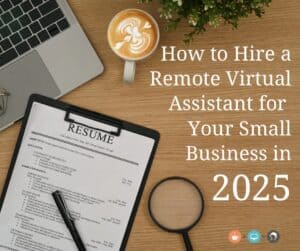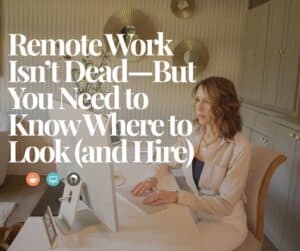How to Hire a Remote Virtual Assistant for Your Small Business in 2025

As a small business owner, your time is one of your most valuable resources. When your to-do list is growing faster than your revenue, it may be time to consider hiring a virtual assistant (VA). VAs can handle administrative tasks, customer service, marketing support, scheduling, and much, much more—freeing you up to focus on growing your business.
In this guide, we’ll walk you through exactly how to hire a virtual assistant for your small business, including where to find one, how to vet them, and why HireMyMom.com is one of the best platforms for finding high-quality, U.S.-based remote VAs.
Why Hiring a Virtual Assistant Makes Sense in 2025
Hiring a virtual assistant is often the first step in building a remote team. According to Forbes, VAs are now a “secret weapon” for entrepreneurs looking to scale without the overhead of full-time employees.
Here are just a few benefits of hiring a virtual assistant:
- Cost-effective compared to in-office staff
- Flexible and scalable depending on your workload
- Specialized support for tasks like email management, invoicing, social media, and more
- Access to a wider talent pool when hiring remotely
Step-by-Step: How to Hire a Remote Virtual Assistant for Small Business
1. Identify What You Want to Delegate
Start by making a list of recurring tasks that are eating up your time. Common responsibilities for virtual assistants include:
- Calendar management and scheduling
- Inbox and communication filtering
- Customer service and CRM updates
- Social media content creation
- Bookkeeping and invoicing
- Research and data entry
Once you’re clear on the tasks, you can begin crafting your job description.
2. Write a Clear Job Description
Be specific about:
- Hours needed per week
- Required skills or software experience (e.g., Asana, Canva, Trello, BaseCamp)
- Your preferred communication style
- Payment terms and timeline
You can use our Remote Job Posting Templates to make this part easier.
3. Choose the Right Hiring Platform
When choosing where to hire virtual assistant talent, consider quality, cost, and ease of use. Sites like Upwork and Fiverr may give you volume, but often at the cost of your time and peace of mind.
At HireMyMom.com, we offer U.S.-based pool of experienced remote professionals, many of whom specialize in virtual assistance.
“I was very happy with my HireMyMom experience. I received applications from so many great candidates. It was so difficult to choose! I’m LOVING my new virtual assistant. It was apparent from day one that she was very qualified and was going to be exactly what I needed to help me grow my business without burning myself out. I’m so grateful that HireMyMom made it easy to quickly connect with quality, highly-skilled women. It was well-worth the investment!” — Megan M.
Why HireMyMom is the Best Place to Hire a Virtual Assistant
If you’re wondering how to hire a remote virtual assistant for small business success, HireMyMom simplifies the entire process.
Here’s what makes us different:
- Talented U.S.-based candidates
- Flexible job posting options with no hidden fees
- Concierge Hiring Service to help you find the best fit and save you time
- Candidates who understand the unique needs of small businesses
- Strong communication skills, reliability, and professionalism
You don’t have to waste hours sifting through unqualified applicants. Let us connect you with someone who is ready to support your business from day one.
How Much Should You Pay a Virtual Assistant?
Rates vary based on experience, task complexity, and time commitment. On average, U.S.-based VAs earn:
- $18–$28/hour for general admin
- $28–$50/hour for specialized support (like marketing or bookkeeping)
We include a pricing guide in our Free Hiring Guide when you sign up for our newsletter.
FAQ: Hiring a Virtual Assistant
How long does it take to hire a VA through HireMyMom?
Most business owners find a great match within 7-14 days depending on their availability to review and interview candidates. You can also fast-track your search while saving a lot of time with our Concierge Service.
Can I hire someone part-time?
Absolutely. Many of our members prefer part-time, flexible roles—perfect for small business owners.
What types of tasks can VAs do?
VAs can handle customer support, marketing, calendar management, research, social media, admin tasks, and more.
Final Thoughts: Ready to Hire a Virtual Assistant?
Hiring a VA is one of the smartest, most efficient ways to grow your business without burnout. And when you partner with HireMyMom, you don’t just get talent—you get someone who will truly care about your success.
Click here to post your job or learn more about our Concierge Hiring Service today.
Stay in the Loop
Want hiring tips, success stories, and small business insights?
Sign up for our newsletter and receive our free hiring guide packed with templates, pricing tips, and expert advice.
HireMyMom.com is here to help you hire smarter, faster, and with confidence.









